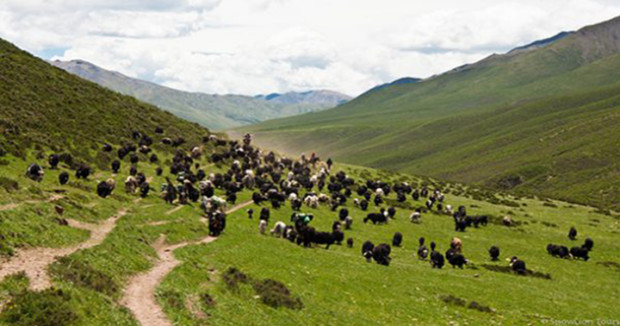Tibetan Nomads Forced off their Land
By Lodoe Gyatso
Tibetan nomads in China’s northwestern Qinghai province are being forced to abandon their traditional grazing lands. Anyone found remaining in banned areas face stiff fines and jail sentences.
The nomads in Golog prefecture’s Darlag county were given no reason for the move. It is customary for Tibetan nomads to release their livestock into the grassland for summer grazing, but this year the Chinese authorities ordered them off the land, giving them until August 23to move. Officials called in armed police to threaten those that did not leave in time. Each of them was fined 1,000 Yuan [US $ 153.7 / £ 116.7 (about 9.900 Indian Rupees) and told that anyone who stayed would be jailed.
Meanwhile, nomads living in the Horkor and Takor villages of Darlag’sDernang township have been ordered to move from their winter camps without being given an alternative place to live.
Tibetan nomads are not allowed to graze in “some of the best pasture land in all of the Tibetan Plateau, especially in the key prefectures of Yulshul and Golog”, Tibet environmental expert Gabriel Lafitte said, adding that Chinese policy provides that resettled nomads be given vocational training and access to markets. “[However], in reality, there is very little vocational training, and resettled nomads have few opportunities to enter the modern economy”, he continued.
In response Tibetan nomads in Golok region have appealed to the Chinese authorities. The English version of the petition stated that, “officials started implementation of a new policy restricting the rights of native pastoralists to use their pastures”.
Citing relevant laws within the Chinese constitution as well as the Qinghai province grassland law, the petitioners stated that they are, “forced to appeal in the hope that the officials of the Peoples’ Republic of China’s People’s Government, putting the interests of the people first, and being committed to the principle of ‘ruling the country by law’ and ‘ruling the country as per law’, will show concern, and make a decision that is in accordance with law and not against custom”.



comment 0